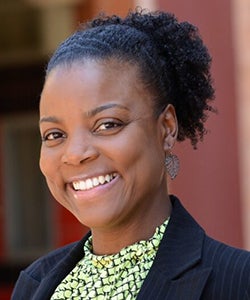
Amid intensifying political scrutiny and financial uncertainty facing America’s colleges and universities, UC Riverside and the University of Michigan have launched a national center to help the governing boards of higher education institutions stay focused on their missions of student success, equity, and long-term sustainability.
The Center for Strategic and Inclusive Governance, or CSIG, provides college and university boards with the resources and guidance they need to remain true to their institutions’ missions—especially during times of political pressure and rapid policy shifts.
The center is led by Raquel Rall, an associate professor and associate dean of strategic initiatives in UCR’s School of Education, and Demetri L. Morgan, an associate professor of education at the University of Michigan.
“We want boards to be active—not just reactive,” Rall said. “Too often, we only hear from boards during crises or presidential transitions. But their responsibility is ongoing—they’re the stewards of long-term sustainability and mission integrity.”
Supported by $400,000 in non-government grants, the center is developing tools, training, and real-time support for college and university board members. It seeks to create what Rall describes as an “open-access, one-stop shop” for governing boards to navigate challenging decisions with clarity, accountability, and equity in mind.
University boards are often composed of appointed trustees from business or legal backgrounds. They play a crucial role in setting policy, hiring presidents, allocating resources, and overseeing institutional direction. Yet many begin their appointments with limited knowledge of the specialized dynamics of higher education or the communities they serve.
The center was founded to fill that gap. It provides a board governance curriculum focused on equitable student success, templates for model policies and meeting agendas, and “rapid-response” toolkits to help boards address controversial issues while staying aligned with institutional values.
The center’s launch comes at a time when diversity, equity, and inclusion, or DEI, programs are under political attack in several states. Some universities have been pressured to remove DEI references from websites or end related initiatives altogether. In this volatile environment, boards must balance political realities with their legal and ethical responsibilities to serve diverse student populations.
Boards don’t need to be activist, but they should be strategic; they don’t run programs that attract students and help them succeed, but they control the resources, and they can ensure those programs are funded and legally compliant, Rall said. Boards also can frame narratives to avoid unnecessary legal risk while protecting student success.
Rall said her team helps boards navigate these challenges by translating federal policy changes into clear, actionable guidance, giving boards clarity about what actions can be taken that are legal and avoid political backlash.
Many institutions, she said, are overreacting to political threats in ways that may cause unnecessary harm.
“Some institutions are preemptively cutting programs out of fear, even when those changes aren’t legally required,” Rall said. “That’s what we call repressive legalism—and it’s hurting the very students universities are meant to support.”
In addition to moral considerations, Rall highlights the financial consequences of abandoning inclusive practices. Many universities, especially public institutions like UCR, rely on Pell Grants to serve large populations of first-generation and low-income students.
The center is designed as a collaborative resource hub. It hosts listening sessions with trustees, university presidents, general counsels, and diversity officers to understand real-time governance challenges. The center also plans to release case studies and podcasts to expand the conversation around mission-driven governance.
“We want CSIG to be the Google of higher ed governance,” Rall said. “If a trustee at a small liberal arts college wants to know their role, we’ve got a primer. If a president wants model board policies, we’ve got templates. If a board needs help interpreting a new federal mandate, we have resources and real people they can talk to.”
The center has already begun advising individual institutions and is building a national advisory board of legal experts, former board members, and academic leaders. A full public launch of its digital platform is expected later this year.
At its core, CSIG is rooted in the belief that higher education is a public good—one that depends on governance with purpose and decisions with vision.
“We’re not just trying to preserve programs,” Rall said. “We’re trying to protect the future of higher education.”




